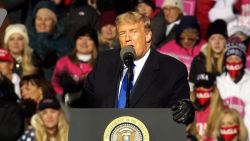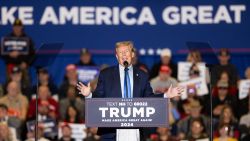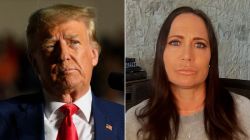On Monday, President Donald Trump tweeted a conspiracy theory suggesting the rules for whistleblowing had recently changed in order to accommodate the recent whistleblower complaint against him; specifically, so that someone with secondhand knowledge could now submit these complaints.
“WHO CHANGED THE LONG STANDING WHISTLEBLOWER RULES JUST BEFORE SUBMITTAL OF THE FAKE WHISTLEBLOWER REPORT? DRAIN THE SWAMP!” Trump tweeted.
Monday’s tweet was at least Trump’s second reference to the theory, which apparently was initially propagated by the right-wing website The Federalist on September 27.
The article claims that “between May 2018 and August 2019, the intelligence community secretly eliminated a requirement that whistleblowers provide direct, first-hand knowledge of alleged wrongdoings.”
Facts First: This is false. The Federalist reading of the form is inaccurate and although the submission form that whistleblowers from the intelligence community fill out was revised in August 2019, the revision did not change the rules on who can submit a whistleblower complaint.
Even so, pro-Trump pundits and lawmakers spread the theory on Twitter and TV over the weekend as evidence of some nefarious plot against Trump. Republican Rep. Jim Jordan of Ohio told Jake Tapper on “State of the Union” that whistleblowers no longer need firsthand knowledge because “they changed the form.”
Tapper pushed back, fact-checking Jordan. “Experts say it has never been true that you need to have firsthand knowledge to be a whistleblower,” Tapper said.
In a statement issued late Monday afternoon, the inspector general of the intelligence community (ICIG) said that the form submitted by the whistleblower on August 12, 2019, was the same one the ICIG has had in place since May 24, 2018. The statement reiterated the fact that having firsthand knowledge of the event has never been required in order to submit a whistleblower complaint. “Although the form requests information about whether the Complainant possesses first-hand knowledge about the matter about which he or she is lodging the complaint, there is no such requirement set forth in the statute.”
“In fact,” the ICIG’s statement continues, “by law the Complainant…need not possess first-hand information in order to file a complaint or information with respect to an urgent concern. The ICIG cannot add conditions to the filing of an urgent concern that do not exist in law.”
What the conspiracy claims
The theory put forth by the President and his allies hinges on the idea that the ICIG recently changed the rules to allow individuals with secondhand knowledge of an event to submit a whistleblower complaint. This is wrong.
A previous version – cited by the Federalist – of the form that whistleblowers submit to alert the inspector general of the intelligence community of an “urgent concern” states that in order for the inspector general to determine that the concern is credible “the IC IG must be in possession of reliable, first-hand information.”
This does not mean that the inspector general would reject a complaint if it presented only secondhand knowledge, but that firsthand information would be needed for the complaint to be found credible and passed further up the chain of command. The inspector general has 14 days from when the complaint is submitted to investigate and make a determination as to whether the urgent concern is credible.
And that’s exactly what happened in the case of this whistleblower.
During the investigation into this specific complaint about Trump’s July 25 call with the Ukrainian President, the inspector general found additional information that “supports the Complainant’s allegation that, among other things, during the call the President ‘sought to pressure the Ukrainian leader to take actions to help the President’s 2020 reelection bid,’ ” according to the letter from the inspector general to Joseph Maguire, the acting director of national intelligence.
What the revised form says
The whistleblower submission form regarding the disclosure of “urgent concerns” that appears on the national intelligence director website has a revision date of August 2019. The new version has a field for the filer to check one of two boxes stating they either have direct knowledge of the event or “heard about it from others.”
Julian Sanchez, a senior fellow at the libertarian Cato Institute who debunked the Federalist claim on Twitter, told CNN that the Federalist’s interpretation of the revision is wrong.
“The very strange thing about this is that if you look at not just a whole slew of other templates of submitting complaints to the IG, but the actual form the Federalist is citing, (the IG) specifically invites complaints that are based on secondhand knowledge,” said Sanchez.
This story has been updated to include a statement from the ICIG
CNN’s Zachary Cohen contributed to this report.




















